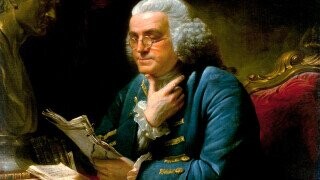Benjamin Franklin Tried To Simplify The English Alphabet ... And Failed

Benjamin Franklin was always coming up with new ideas. His mind was wired to invent, which gave the world bifocals, the lightning rod, an improved catheter (no, seriously), and … a failed alphabet.
Spelling in English can be difficult. Sounds can be made using multiple different letters or combinations, and knowing which to use can be more a matter of memorization rather than working it out using knowledge of the language. Franklin, who liked life to be as logical as possible, thought that this was redundant, unnecessary.
Don't Miss
This is why Franklin’s new American alphabet cut out C, J, Q, W, X, and (not sometimes, all the times) Y. In his mind, why would the letter c exist when there were already letters that could cover the hard and soft sounds unambiguously? His alphabet was not only about taking letters away, though. He also added a few of his own to turn sounds like “th” into single characters.
Have you no respect for songwriting, sir?
Franklin’s phonetic alphabet predates the United States’ independence, as Franklin invented the system in 1768. If it had any hope of succeeding, people would need to see it in action, but this presented a problem. Franklin was a publisher, but he had to create new printing press blocks for his new proposed character. Without this, his new letters were useless in publications. Finally, years later, he did get to publish his system in “A Reformed Mode of Spelling.”
The primary goal of this new alphabet was to simplify the English language, but there was likely a patriotic motivation as well. A language of their own could help demonstrate that the United States was truly independent of Great Britain. Now, as noble as that may have been, the idea never caught on among the masses. Famed lexicographer Noah Webster tried to adopt it, but Ben Franklin’s phonetic alphabet died out without any fanfare. Those who did know about Franklin’s alphabet mostly just made fun of it.
If spelling is frustrating to you, take some solace in knowing that Ben Franklin tried to help you out. For everyone else, we’re not missing much. The samples of writing that use Franklin’s alphabet are … nightmarish. Plus, if it’s any consolation, we spell "color" differently than the British, so in a way, America still has its own (superior) English.
Top Image: David Martin